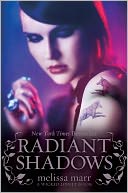 Radiant Shadows is the fourth book in Melissa Marr’s Wicked Lovely YA fairy series. It follows on from Fragile Eternity, focusing more on characters that have previously featured only briefly in the series. In particular, it tells the story of Devlin (High Court regent Sorcha’s ‘brother-son’), Ani (the daughter of Gabriel and sister of tattooist Rabbit) and Bananch (Sorcha’s twin sister and the embodiment of War and Discord).
Radiant Shadows is the fourth book in Melissa Marr’s Wicked Lovely YA fairy series. It follows on from Fragile Eternity, focusing more on characters that have previously featured only briefly in the series. In particular, it tells the story of Devlin (High Court regent Sorcha’s ‘brother-son’), Ani (the daughter of Gabriel and sister of tattooist Rabbit) and Bananch (Sorcha’s twin sister and the embodiment of War and Discord).
Although the series began with a rather straightforward division of ‘humans’ and ‘fairies’, the books have gradually complicated this division with the introduction of new types of creature in each installment. I think that Radiant Shadows is perhaps the most complex version of the human/fey divide, as much of it concentrates on the story of a ‘halfling’ (born of a human mother and a fey father) and the shade of a once-human girl (who has technically died, but is kept ‘alive’ through her relationship with the fairy Devlin). Nothing is quite as simple as it first seemed in Wicked Lovely, with a number of newly-made fairies (who were once human) featuring prominently in Radiant Shadows.
This was not my favorite book in the series, and I’m not sure it quite lives up to the promise ofFragile Eternity and the earlier books. While Ani, Devlin and Rae are great characters, I didn’t find them quite as compelling as Sorcha (who was a central character in the previous book), Aislinn, Leslie, Donia or Keenan. Nevertheless, all these characters make an appearance, and I enjoyed the development of the characters of Irial and Niall (who featured in Ink Exchange). The final showdown also had me holding my breath, as Marr filled it with tension and high emotion. This series is a strong one, and Radiant Shadows is still a great piece of YA urban fantasy.
This book is recommended for fans of the earlier Wicked Lovely books, and belongs alongside other YA urban fantasy, particularly books by Holly Black and Carrie Need.
Contains: some references to sexuality, violence and death (not explicit)
Reviewed by: Hannah Kate